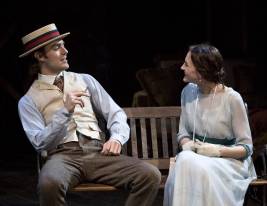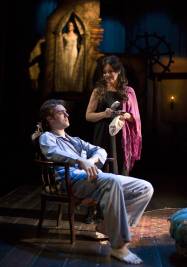
“The thing for you to give up is your affectations, your little put-on mannerisms that make you seem, well, slightly peculiar to people. You express yourself in fantastic high-flown phrases. Your hands fly about you like a pair of wild birds! You get out of breath, you stammer, you laugh hysterically and clutch at your throat.”
–Reverend Winemiller, The Eccentricities Of A Nightingale
It can’t have been easy for Tennessee Williams growing up gay in the South in the early 20th Century, and the above-quoted advice could easily have been given to him by a well-meaning father unaware of the hurt his words could inflict. In fact, words like these are probably still being heard, even in 2011, by gay youths whose outcast status leaves them very little faith that it will ever (in the words of a spate of recent YouTube videos) “get better.”
The Tennessee Williams character at the receiving end of a father’s concern turns out, however, not to be a gay boy, and not even a boy at all, but Alma Winemiller, the 20something heroine of The Eccentricities Of A Nightingale, not surprisingly the Williams creation the playwright considered closest to himself.
The author of The Glass Menagerie, A Streetcar Named Desire, and Cat On A Hot Tin Roof is far from the only writer to have created a female character based on himself. Back in the pre-Stonewall days, it would have been unthinkable for a play to feature an effeminate gay man as its hero, and it may not even have crossed the minds of the 1960s audiences who first saw this rewrite of 1948’s Summer And Smoke that Alma was anything other than what she seemed on the surface.
Now we know better, and it is our ability to look at The Eccentricities Of A Nightingale though contemporary eyes that makes it a particularly fascinating part of the Williams oeuvre.
Briefly put, The Eccentricities Of A Nightingale gives us one-half year in the life of Alma Winemiller, opening with the 4th Of July festivities that reveal her infatuation with neighbor John Buchanan and closing (or nearly so) with their New Year’s Eve together, six months that mark Alma’s life forever.
With an Episcopal clergyman for a father and a nutcase for a mother, life is hardly the easiest for the passionate young woman whose “eccentricities” reflect a fire for living that few around her can understand. As for her crush on the magna cum laude Johns Hopkins Medical School graduate-next-door, Alma can hardly expect much to come from it given the short leash his controlling, manipulative mother allows him. In fact, the only place where Alma feels any kind of kinship is with the group of oddballs with “vaguely cultural” interests who meet Mondays at the church rectory.
A flamboyant misfit. A young man with a pathologically overbearing mother. A place where freaks congregate so as to feel not so out of place. Talk about gay subtext! As for plot, not much “happens” over Eccentricities three acts, performed in its current revival at Glendale’s A Noise Within with a single intermission. Williams did indeed succeed in eliminating the melodrama he felt detracted from Summer And Smoke’s effectiveness, leaving in its stead a character study and a glimpse into a woman’s heart and soul.
The Eccentricities Of A Nightingale is but the latest in a string of triumphs for California’s Home For The Classics, yet another directorial bull’s-eye for Dámaso Rodriguez, and further evidence that L.A. acting treasure Deborah Puette can do no wrong.
Following the Sunday matinee performance reviewed here, Puette was off to the Zephyr to play another Southern belle in the long-running Caught, the two roles reflecting the multiple award-winner’s versatility and virtuosity. Whereas Caught’s Darlene is a woman whose transformation we watch with joy and wonder, Eccentricities’ Alma provokes a combination of admiration and pity, admiration for her unsinkable pluck and pity for her caged existence in a world which refuses to acknowledge her talents, her spirit, and her capacity for love. Whether deliberate or simply the result of following Williams’ description of Alma’s quirks and mannerisms to a T, it’s easy to see superimposed on Alma the gay man Tennessee was—from her extravagant hand and arm gestures to her hysterical shrieks of laughter. At this point in 2011, Puette would seem to have a lock on L.A. Actress Of The Year.
Surrounding and supporting Puette, there’s not a weak link in the entire A Noise Within cast, beginning with a magnetic Jason Dechert as John Buchanan.
Were Tennessee alive today, it’s easy to see him falling for Dechert’s John, the talented young actor’s sultry good looks and engaging stage presence making him positively irresistible, even as his relationship with his mother (a deliciously imperious and clinging Christopher Callen) borders on the incestuous. (It’s hard to watch Callen not merely washing Dechert’s “footsies”—per Williams’ stage directions—but actually giving one of his toes a kiss without cringing.) Mitchell Edmonds does his accustomed splendid work as Alma’s dictatorial father, whose domineering behavior has contributed to the insanity of Alma’s mother (Jill Hill at her quirky best). As Alma’s kindred spirits, Dave Kirkpatick as Roger Doremus, Jacque Lynn Colton as Mrs. Bassett, Darby Bricker as Rosemary, and David LM McIntyre as Vernon not only do terrifically detailed work, but provide comic relief precisely when needed. Hank Ostendorf makes a strong impression in his cameo as a salesman whom a wiser (though not necessarily sadder) Alma meets in the play’s epilogue. Ensemble members Erika Salomon, Stephanie Zoe Demetriades, and Tameé Seidling insure swift scene changes in period garb.
As for Joel Daavid’s scenic design, it’s hard to imagine one that better respects Williams’ instructions that the play’s various locales (a public square, a rectory parlor, the Buchanans’ living room, a doctor’s office, a rented room) be “barely suggested” by windows and doorframes and a few essential properties. I especially liked the meshing gears suspended upstage and representing the “Musée Mechanique” that is one of the play’s leitmotifs. (Unfortunately, a series of projections essential to Daavid’s vision were non-functioning at the performance reviewed here, and had to be described by cast members at a fascinating post-performance talkback.)
The rest of the design team matches Daavid’s vision: Leah Piehl’s early 20th Century costumes, James P. Taylor’s atmospheric lighting design, Andrew Villaverde’s equally mood-enhancing sound design, Renee Thompson Cash’s period properties, and Rosey Johnson’s wig, hair, and makeup design.
Brian Zimmer is assistant director, Jane Marie DeRosa second assistant director, Christie Wright Gilmore stage manager, and Christine Breihan assistant stage manager. Gwenmarie White is sound board operator, Meghan Kennedy production manager, Adam Lillibridge technical director, Ronnie J. Clark master electrician, and Alexandra Dunn scenic artist.
Eccentricities Of A Nightingale is the fourth Tennessee Williams work to be staged by the illustrious A Noise Within (following The Glass Menagerie, Cat On A Hot Tin Roof, and The Night Of The Iguana). As the play that closes ANW’s final season in Glendale, it does so with a bang as bright as the fireworks that lights Alma Winemiller’s face on that 4th Of July evening nearly a century ago.
A Noise Within, 234 South Brand Blvd., Glendale.
www.ANoiseWithin.org
–Steven Stanley
April 17, 2011
Photos: Craig Schwartz





 Since 2007, Steven Stanley's StageSceneLA.com has spotlighted the best in Southern California theater via reviews, interviews, and its annual StageSceneLA Scenies.
Since 2007, Steven Stanley's StageSceneLA.com has spotlighted the best in Southern California theater via reviews, interviews, and its annual StageSceneLA Scenies.







 COPYRIGHT 2025 STEVEN STANLEY :: DESIGN BY
COPYRIGHT 2025 STEVEN STANLEY :: DESIGN BY